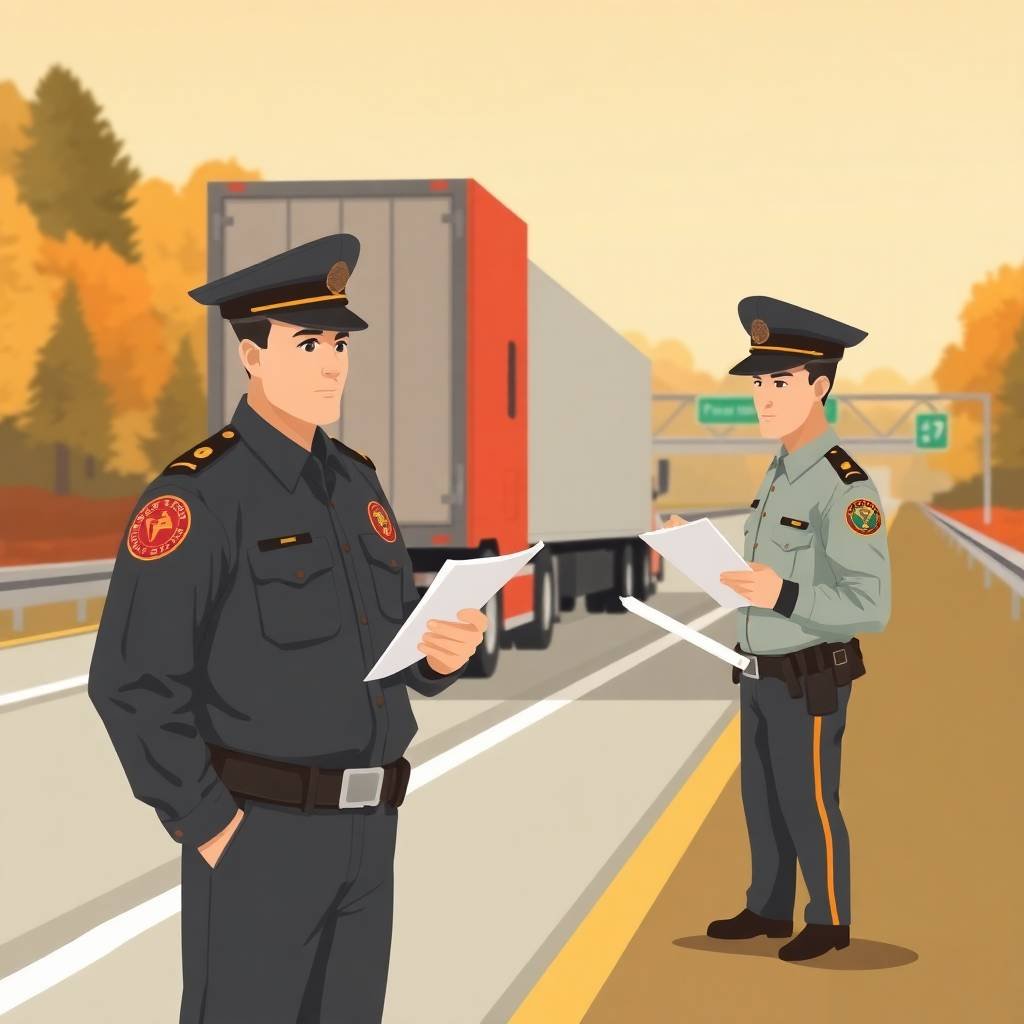1. Understanding the Basics of Pre-Employment DOT Drug Testing Requirements
For any company operating in the commercial transportation industry, complying with Pre-Employment DOT Drug Testing Requirements is not optional—it’s federal law. The Department of Transportation (DOT) mandates that all safety-sensitive employees, including truck drivers, must undergo drug testing before operating a commercial motor vehicle (CMV). This article breaks down the essentials of these requirements and offers guidance to help your organization stay compliant.
What Are Pre-Employment DOT Drug Testing Requirements?
The Pre-Employment DOT Drug Testing Requirements are designed to ensure that any driver hired to operate a CMV is free from controlled substances before they begin duty. According to the Federal Motor Carrier Safety Administration (FMCSA), employers must receive a negative drug test result before permitting a driver to perform any safety-sensitive functions.
These tests must comply with protocols laid out by the Department of Transportation and are a critical component of overall Drug and Alcohol Testing Compliance. The test typically screens for marijuana, cocaine, opiates, amphetamines, and phencyclidine (PCP).
Who Is Required to Be Tested?
All applicants for a safety-sensitive position must be tested. This includes new hires and anyone transferring into a role requiring a commercial driver’s license (CDL). To ensure full compliance with Pre-Employment DOT Drug Testing Requirements, employers should consult the Driver Qualification File Requirements and avoid DQ file violations.
Common Mistakes to Avoid
One of the most frequent FMCSA compliance mistakes is failing to document the test result properly or allowing a driver to begin work before receiving the results. It’s also critical to check the FMCSA Clearinghouse for past violations. Learn how to stay compliant with our post on FMCSA Clearinghouse Compliance.
Audit Readiness and Compliance
A DOT audit can happen at any time. Preparing ahead by reviewing the DOT Compliance Checklist and using a trusted DOT Audit Preparation service can save your business from costly penalties. If you’re preparing for the upcoming cycle, review our 2025 DOT Audit Preparation Guide.
Ongoing Support for Compliance
Ensuring long-term Pre-Employment DOT Drug Testing Requirements compliance involves more than one-time testing. Our Drug and Alcohol Testing Management services provide continuous oversight, while our DQ File Setup and Monitoring helps organize critical documents.
We also offer UCR Filing Assistance and support with IFTA, IRP & BOC-3 filings—both essential for staying ahead in a regulatory-heavy environment.
Schedule Help and Access More Resources
If you’re unsure whether your hiring process meets Pre-Employment DOT Drug Testing Requirements, schedule your free consultation. Explore our Compliance Services for Trucking Companies, or if you’re an independent operator, check out our FMCSA Compliance Services for Owner Operators and Owner Operator Solutions.
You can also view all our latest posts to stay current on FMCSA updates and news.
Disclaimer: Please review our Disclaimer.
Privacy: See how we manage your data in our Privacy Policy.
Terms: Review our Terms of Service.

2. Step 1: Verify FMCSA Coverage and Applicability
When establishing a compliant commercial motor carrier operation, understanding whether your business falls under the authority of the Federal Motor Carrier Safety Administration (FMCSA) is the crucial first step. This verification is essential for ensuring full adherence to Pre-Employment DOT Drug Testing Requirements, a critical element of DOT compliance that affects hiring, operational practices, and audit preparedness.
Who Must Comply with FMCSA Regulations?
Carriers operating commercial motor vehicles (CMVs) with a gross vehicle weight rating (GVWR) of 10,001 pounds or more in interstate commerce fall under FMCSA regulations. If you’re unsure of your status, the official FMCSA site provides up-to-date guidance. Once coverage is confirmed, your company must implement a compliant Drug and Alcohol Testing Program, including proper execution of Pre-Employment DOT Drug Testing Requirements.
Why Verification Matters for Drug Testing Compliance
Failing to verify FMCSA applicability can lead to devastating consequences. Without accurate classification, companies may neglect vital responsibilities such as meeting Pre-Employment DOT Drug Testing Requirements, maintaining Driver Qualification Files, and performing DQ File Monitoring. These oversights often lead to FMCSA compliance mistakes and potential fines during audits.
To understand your obligations under federal law, consult the Department of Transportation and stay informed through federal policy updates available at WhiteHouse.gov.
Confirm Coverage Before Hiring
Before hiring any safety-sensitive employee, verifying FMCSA applicability ensures your Pre-Employment DOT Drug Testing Requirements are triggered correctly. Companies must receive a verified negative drug test result before allowing a driver to operate a CMV. More details on this process can be found in our post on FMCSA Clearinghouse Compliance, which outlines how past violations can impact eligibility.
Tools and Resources to Stay Compliant
Our DOT Compliance Checklist and DOT Audit Preparation Services help you stay on top of requirements like the FMCSA Safety Measurement System (SMS) and ensure your drivers are audit-ready.
For more guidance on Pre-Employment DOT Drug Testing Requirements, schedule an appointment with a compliance specialist. We offer tailored services, including Drug and Alcohol Testing Management, UCR Filing Assistance, and IFTA/IRP/BOC-3 Support.
Why Truckers Trust Compliance Hub
Visit Truckers Compliance Hub for regular posts and resources. Whether you’re a fleet owner or an independent operator, we offer dedicated services for owner-operators and detailed help for trucking companies.
To better understand your compliance obligations and FMCSA applicability, explore our resources designed specifically for owner-operators.
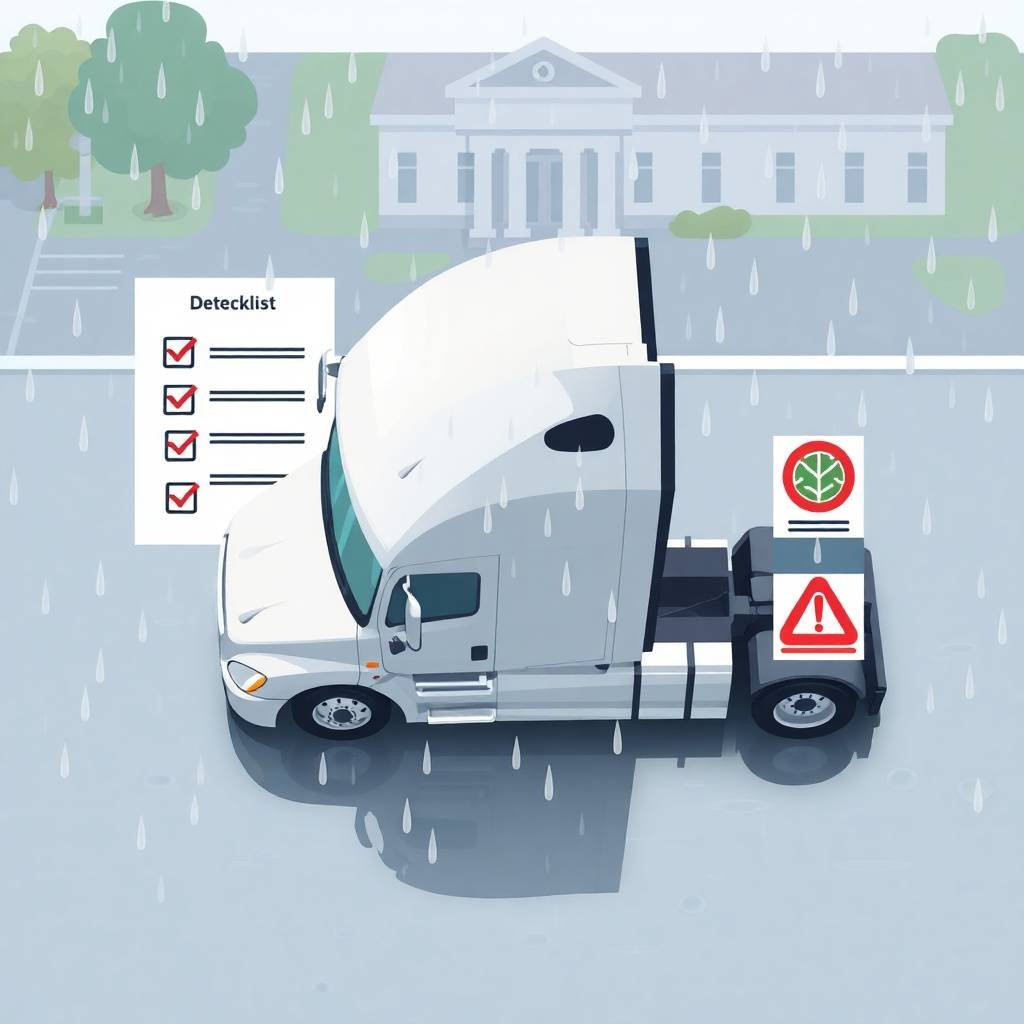
3. Step 2: Implement a Written Drug and Alcohol Testing Policy
Establishing a compliant and enforceable Drug and Alcohol Testing Policy is a vital second step in meeting Pre-Employment DOT Drug Testing Requirements for commercial motor carriers. This written policy not only aligns with federal expectations but also sets the foundation for consistent and transparent workplace safety procedures.
Why a Written Policy is Critical
The Federal Motor Carrier Safety Administration (FMCSA) mandates that all employers of CDL drivers develop and maintain a formal drug and alcohol testing policy. According to FMCSA, this policy must be in writing and communicated clearly to all safety-sensitive employees. A well-structured policy ensures compliance with Pre-Employment DOT Drug Testing Requirements, as well as random, post-accident, reasonable suspicion, return-to-duty, and follow-up testing.
Failure to document and enforce your policy can lead to costly DQ file violations, jeopardize safety ratings, and trigger penalties during a DOT audit.
Components of a Compliant Policy
To fully meet Pre-Employment DOT Drug Testing Requirements, your policy must include:
- Clear designation of a Designated Employer Representative (DER)
- Testing procedures and substances tested
- Employee notification and acknowledgment
- Consequences of refusing or failing a test
- Use of certified laboratories and Medical Review Officers (MROs)
- Integration with FMCSA Clearinghouse rules
Need help building your policy? Our Drug and Alcohol Testing Management services ensure your procedures are audit-ready and fully compliant.
Aligning with Federal Regulations
Carriers must ensure policies are in line with federal regulations as outlined on the U.S. Department of Transportation website. Policy updates should reflect current mandates published by both FMCSA and updates shared on WhiteHouse.gov.
Compliance doesn’t stop at documentation. It extends to correct implementation and ongoing oversight, which is why so many fleets rely on Truckers Compliance Hub for guidance and execution.
Ensuring Policy Compliance Before Hiring
The role of a written policy is especially significant during the hiring process. Pre-Employment DOT Drug Testing Requirements state that all CDL drivers must pass a drug test before performing safety-sensitive functions. This step must occur after receiving a verified negative test result. The policy should guide employers through this requirement and include steps for querying the FMCSA Clearinghouse.
To avoid costly FMCSA compliance mistakes, make policy review part of your Driver Qualification File Requirements. We also offer DQ File Setup and Monitoring to help you stay on track.
Staying Audit-Ready with Policy Documentation
DOT auditors will review your drug and alcohol testing policy for completeness and compliance. Our DOT Audit Preparation services help clients prepare for this scrutiny. Additionally, use our DOT Compliance Checklist to stay organized.
For owner-operators or small fleet managers, we also offer specialized resources and services:
- FMCSA Compliance Services for Owner Operators
- Owner-Operator Support Packages
- Help for Trucking Companies
Our team helps streamline compliance so you can focus on growing your business. We also assist with UCR Filing and IFTA/IRP/BOC-3 Support.
Take the Next Step Toward Compliance
Your policy is your protection. Ensure it’s structured, current, and enforceable. For assistance in developing or reviewing your policy for Pre-Employment DOT Drug Testing Requirements, schedule a free consultation with a compliance specialist.
For insights, updates, and strategies, visit our main site for the latest posts and tools.

4. Step 3: Choose a Certified Testing Laboratory and TPA
Meeting Pre-Employment DOT Drug Testing Requirements is more than a regulatory formality—it’s a critical element of any safety-sensitive operation in the transportation industry. Once your written policy is in place, the next essential step is selecting a certified drug testing laboratory and a trusted Third-Party Administrator (TPA) to manage your testing program.
Why Certification and Compliance Matter
The U.S. Department of Transportation (DOT) and FMCSA strictly regulate drug and alcohol testing under 49 CFR Part 40. To ensure full compliance with Pre-Employment DOT Drug Testing Requirements, employers must use Department of Health and Human Services (HHS) certified laboratories. These labs are approved to test for the five required drug classes: marijuana, cocaine, amphetamines, opiates, and phencyclidine (PCP).
Failure to use certified facilities or trusted TPAs can result in data inaccuracies, recordkeeping errors, or even DQ file violations. These missteps can lead to larger FMCSA compliance mistakes that impact your company’s safety score and lead to enforcement action.
What to Look for in a Certified Laboratory
Not all laboratories are created equal. When verifying labs for Pre-Employment DOT Drug Testing Requirements, consider the following:
- HHS Certification: Confirm the lab is listed on the current HHS-certified list.
- Turnaround Times: Prompt results keep your hiring process on track.
- Chain of Custody: The lab should have strict documentation protocols.
- MRO Support: A certified Medical Review Officer should review all positive test results.
Our Drug and Alcohol Testing Management service simplifies this process, ensuring all required DOT standards are met with zero guesswork.
The Role of a Third-Party Administrator (TPA)
A TPA acts as your compliance partner—handling scheduling, recordkeeping, random selections, and result management. Working with an experienced TPA that understands Pre-Employment DOT Drug Testing Requirements is essential, especially for small fleets or owner-operators juggling multiple responsibilities.
Truckers Compliance Hub works with vetted TPA partners who are fully versed in FMCSA Clearinghouse Compliance, ensuring real-time data tracking and reporting. Whether you’re preparing for an audit or updating your Driver Qualification Files, we’ve got you covered.
Reducing Risk Through Expert Compliance Services
Choosing the wrong TPA or lab can lead to costly audit failures. If you’re unsure where to begin, start with our DOT Compliance Checklist. It outlines everything you need to establish a fully compliant program from the start.
Additionally, we help carriers avoid risk with services such as:
Need assistance aligning your vendor choices with Pre-Employment DOT Drug Testing Requirements? Schedule a free consultation with one of our compliance specialists today.
Staying Informed and Proactive
Staying updated with regulatory changes from WhiteHouse.gov and FMCSA’s Safety Measurement System (SMS) helps ensure your operations remain compliant. As part of our ongoing education initiative, we offer insights into Drug and Alcohol Testing Compliance and help you stay ahead of audit triggers and enforcement actions.
For even more guidance, check out our posts and expert articles on TruckersComplianceHub.com, including:
- FMCSA Compliance Help for Trucking Companies
- FMCSA Services for Owner Operators
- Specialized Owner-Operator Support
Final Thoughts
Selecting a certified testing lab and trusted TPA is not just a checkbox—it’s a strategic move that ensures full compliance with Pre-Employment DOT Drug Testing Requirements. By choosing the right partners and following a clear compliance path, you avoid costly errors and ensure the safety and integrity of your operations.
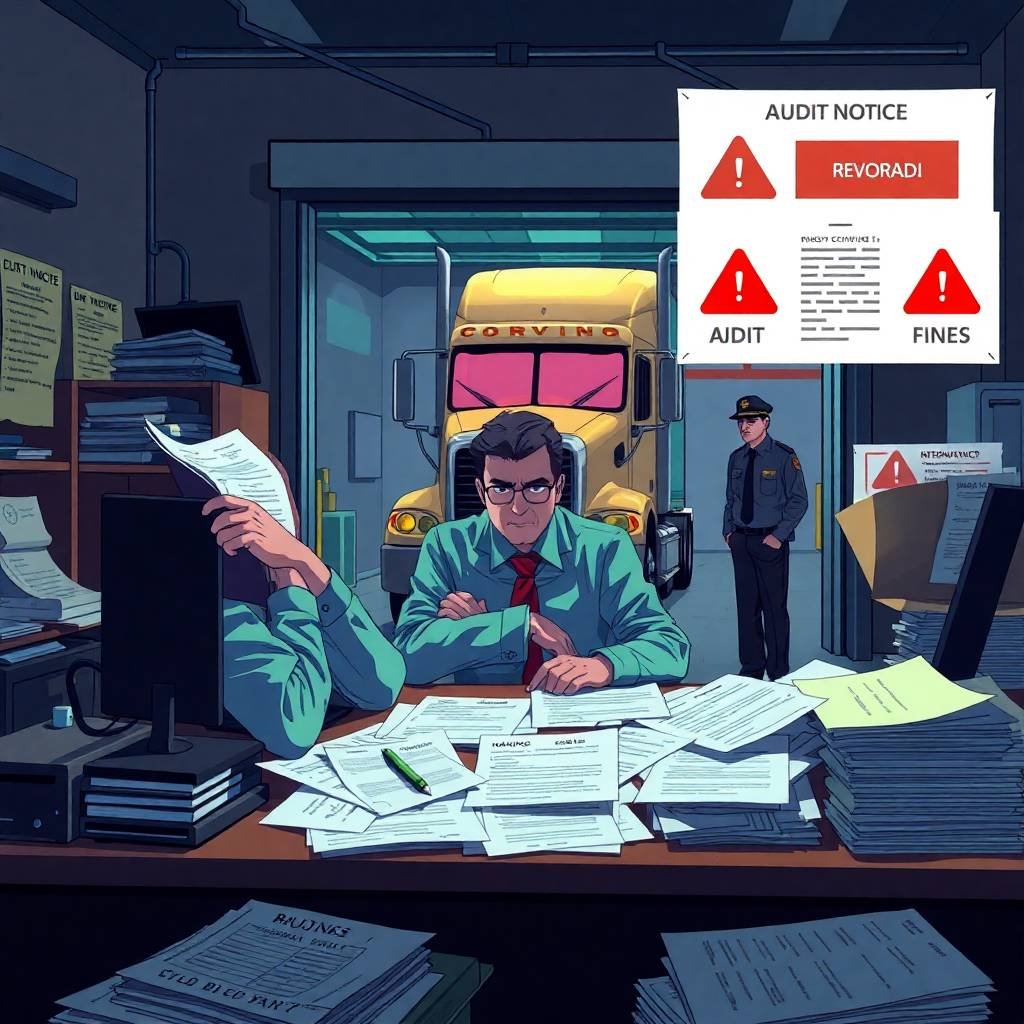
5. Step 4: Conduct Tests Before Safety-Sensitive Functions Begin
Ensuring compliance with Pre-Employment DOT Drug Testing Requirements is essential for any carrier or employer hiring commercial drivers. One of the most critical and non-negotiable steps is conducting drug testing before a driver performs any safety-sensitive function such as operating a commercial motor vehicle (CMV). This step is not only mandatory under federal law, but also vital for maintaining workplace safety and avoiding serious regulatory penalties.
The Legal Foundation for Pre-Employment Testing
According to the U.S. Department of Transportation (DOT) and Federal Motor Carrier Safety Administration (FMCSA), employers must conduct drug tests before a new driver is allowed to operate in a safety-sensitive role. This is a cornerstone of the Pre-Employment DOT Drug Testing Requirements. No driver may begin duty requiring the operation of a CMV until a negative drug test result is obtained.
This requirement helps enforce drug-free workplace standards set forth by federal agencies and aligns with broader safety goals set by WhiteHouse.gov.
Timing is Everything
One of the most common FMCSA compliance mistakes is allowing drivers to begin duties before the test results are returned. Doing so can result in significant violations and even jeopardize your company’s standing in the FMCSA Safety Measurement System.
Our comprehensive DOT Compliance Checklist ensures you follow the correct timeline—from offering conditional employment to receiving and documenting the drug test results properly.
The Testing Process and Documentation
For complete compliance with Pre-Employment DOT Drug Testing Requirements, employers must:
- Use an HHS-certified lab and authorized Third-Party Administrator (TPA)
- Ensure the test covers the five-panel drug screen (marijuana, cocaine, amphetamines, opiates, and PCP)
- Retain results in the driver’s Driver Qualification File
Any deviation from this protocol may result in DQ file violations, which are closely scrutinized during DOT audits.
Aligning with the FMCSA Clearinghouse
Employers must also verify that a prospective driver is not prohibited from performing safety-sensitive functions due to drug and alcohol program violations. This is done through the FMCSA Drug and Alcohol Clearinghouse, a federal database that tracks violations and test results.
Our team can assist you in conducting these queries as part of your Drug and Alcohol Testing Compliance responsibilities. It’s one more way we help carriers stay aligned with Pre-Employment DOT Drug Testing Requirements.
Streamlining Compliance with Professional Support
Trying to manage all these steps in-house can be overwhelming—especially for small fleet owners and independent operators. At Truckers Compliance Hub, we simplify the compliance process with services like:
- Drug and Alcohol Testing Management
- DQ File Setup and Monitoring
- DOT Audit Preparation
- UCR Filing Assistance
- IFTA, IRP & BOC-3 Support
If you’re unsure how to proceed, schedule your free consultation today.
Keeping Your Business FMCSA-Ready
Carriers and owner-operators alike must ensure that every aspect of their hiring process meets Pre-Employment DOT Drug Testing Requirements. Whether you’re hiring your first driver or scaling your fleet, you can access tools and resources like:
- FMCSA Compliance Services for Owner-Operators
- FMCSA Compliance Help for Trucking Companies
- Owner-Operator Compliance Resources
Stay current with the latest regulatory updates and insights on our blog at TruckersComplianceHub.com.
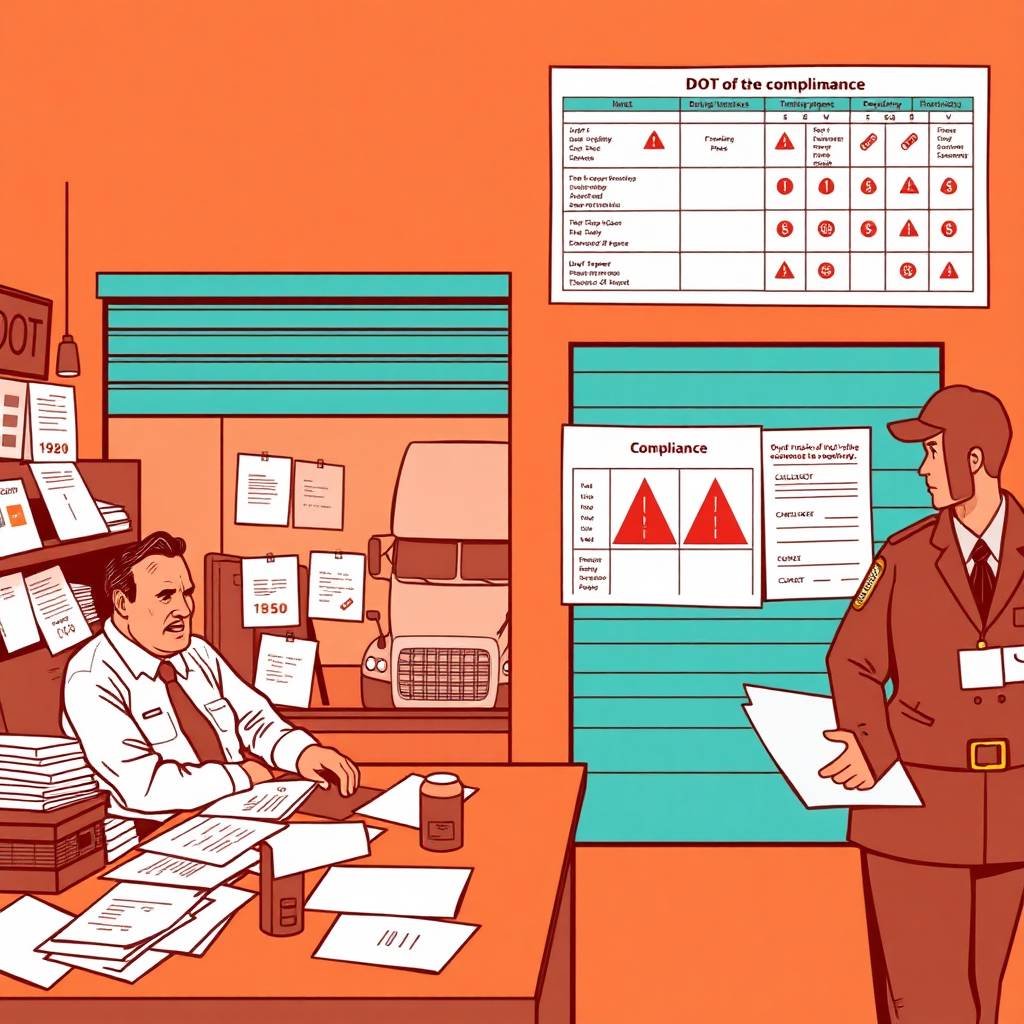
6. Step 5: Maintain Driver Qualification (DQ) File Accuracy
Ensuring compliance with Pre-Employment DOT Drug Testing Requirements extends beyond initial testing—it includes long-term management of a driver’s qualifications. One of the most critical compliance steps for motor carriers is maintaining complete, accurate, and up-to-date Driver Qualification (DQ) Files. Failure to manage DQ files properly can result in costly fines and disqualification of drivers from performing safety-sensitive functions.
Why DQ File Accuracy Matters
The Federal Motor Carrier Safety Administration (FMCSA) mandates that every commercial driver have a current DQ file on record. These files serve as proof that the driver meets all federal safety requirements, including Pre-Employment DOT Drug Testing Requirements. An incomplete or inaccurate file can lead to violations and impact your Safety Measurement System (SMS) scores in the FMCSA Safety Measurement System 2025.
For an overview of DQ file obligations, consult our Driver Qualification File Requirements guide.
What Should Be in the DQ File?
To comply with Pre-Employment DOT Drug Testing Requirements, your DQ file must include:
- A negative pre-employment drug test result
- Motor vehicle records from each state where the driver held a license in the past three years
- Employment verification and road test documentation
- Medical examiner’s certificate (MEC)
You can find a complete checklist in our DOT Compliance Checklist.
Additionally, if you’re struggling with document management, our DQ File Setup and Monitoring service offers expert assistance.
Common Violations and Mistakes
Many carriers underestimate how easy it is to commit DQ file violations. These violations often stem from poor recordkeeping and neglecting updates, such as failing to include a new FMCSA Clearinghouse Compliance query result or a lapse in documenting Pre-Employment DOT Drug Testing Requirements.
Errors can also surface during a DOT audit, leading to enforcement actions and, in severe cases, operational shutdowns. To prepare, consider our DOT Audit Preparation services, designed to identify and correct documentation gaps before they become liabilities.
Integrating Drug Testing Into DQ Files
Your DQ file must reflect compliance with all drug and alcohol testing regulations, especially those under Pre-Employment DOT Drug Testing Requirements. This includes documentation from certified labs and TPAs, which must align with Transportation.gov standards and policies supported by WhiteHouse.gov.
Our Drug and Alcohol Testing Management service ensures accurate documentation and seamless integration into driver files.
Avoiding FMCSA Compliance Mistakes
Maintaining accurate DQ files plays a key role in avoiding serious FMCSA compliance mistakes. Errors such as missing drug test results or outdated medical certificates can harm your company’s reputation and trigger DOT investigations.
If you’re unsure where to start, schedule a 30-minute consultation to receive customized compliance guidance.
Support for All Fleet Sizes
Whether you’re an established carrier or an owner-operator, staying compliant with Pre-Employment DOT Drug Testing Requirements and DQ file mandates can be streamlined with support from Truckers Compliance Hub. Our services also include:
For more targeted assistance, explore our resources for trucking companies and owner-operators including this specialized service page.
You can always view our latest updates and industry posts on our homepage at TruckersComplianceHub.com.

7. Step 6: Cross-Check Results with the FMCSA Drug & Alcohol Clearinghouse
Meeting Pre-Employment DOT Drug Testing Requirements is not just about conducting tests; it’s also about verifying the results through official channels. The FMCSA Drug & Alcohol Clearinghouse serves as a centralized database that helps employers ensure commercial drivers are eligible to perform safety-sensitive functions. Cross-checking drug and alcohol test results in the Clearinghouse is a federally mandated step in the hiring process—and one of the most critical for maintaining DOT compliance.
What is the FMCSA Drug & Alcohol Clearinghouse?
The Clearinghouse is a secure, online repository maintained by the Federal Motor Carrier Safety Administration (FMCSA). It tracks commercial drivers’ drug and alcohol violations, including failed tests, refusals, and return-to-duty processes. When fulfilling Pre-Employment DOT Drug Testing Requirements, employers must query the Clearinghouse before permitting a driver to operate a commercial motor vehicle.
You can read more on the process in our full guide on Drug and Alcohol Testing Compliance.
Why Cross-Checking Is a Legal Requirement
According to the U.S. Department of Transportation, employers are legally required to check a driver’s Clearinghouse record before employment and annually thereafter. These checks ensure that no driver with unresolved violations is allowed to perform regulated duties. It’s a vital part of Pre-Employment DOT Drug Testing Requirements that prevents hiring ineligible drivers and avoids penalties.
Failure to comply can lead to serious violations. Learn more about these risks in our post on FMCSA Compliance Mistakes.
How to Perform a Clearinghouse Query
Employers must register with the Clearinghouse and obtain consent from the driver for a full query. Once a Pre-Employment DOT Drug Test is complete, you must cross-check the results to confirm that the driver has no unresolved drug or alcohol violations.
To stay organized, you can use our DOT Audit Preparation services or DQ File Setup and Monitoring tools to streamline these checks and ensure documentation is audit-ready.
Integrating Results with Driver Qualification Files
All Clearinghouse query results must be included in the Driver Qualification (DQ) File. This ensures that Pre-Employment DOT Drug Testing Requirements are fully documented and compliant with both FMCSA and DOT regulations. If a query shows that a driver is prohibited from performing safety-sensitive duties, that driver must be removed immediately from the hiring pool.
If you’re unsure how to maintain proper documentation, our Drug and Alcohol Testing Management services can help you remain compliant.
Avoiding DQ File Violations
Errors in DQ file management can lead to violations that not only damage your business’s reputation but also threaten its operational status. Make sure all Clearinghouse queries, along with pre-employment test results, are accurately stored and retrievable.
Refer to our DOT Compliance Checklist to review all necessary documentation for new drivers and ensure you’re covering every aspect of Pre-Employment DOT Drug Testing Requirements.
Stay Ahead with Expert Help
Compliance with the Clearinghouse and drug testing protocols is essential to maintaining a safe and legal operation. Whether you’re managing a fleet or operating as an independent driver, Truckers Compliance Hub offers tailored solutions such as:
For industry insights and updates, visit our homepage at TruckersComplianceHub.com.
To speak with a compliance expert, schedule your free 30-minute consultation today.
You can also explore more compliance resources and services tailored to trucking companies and owner-operators, including this service page.
Final Thoughts
Cross-checking drug and alcohol test results in the FMCSA Clearinghouse is a non-negotiable part of Pre-Employment DOT Drug Testing Requirements. It safeguards the roadways and ensures that only qualified, substance-free drivers are hired. With guidance from trusted sources like WhiteHouse.gov and FMCSA, and professional support from Truckers Compliance Hub, your business can meet and exceed compliance standards.
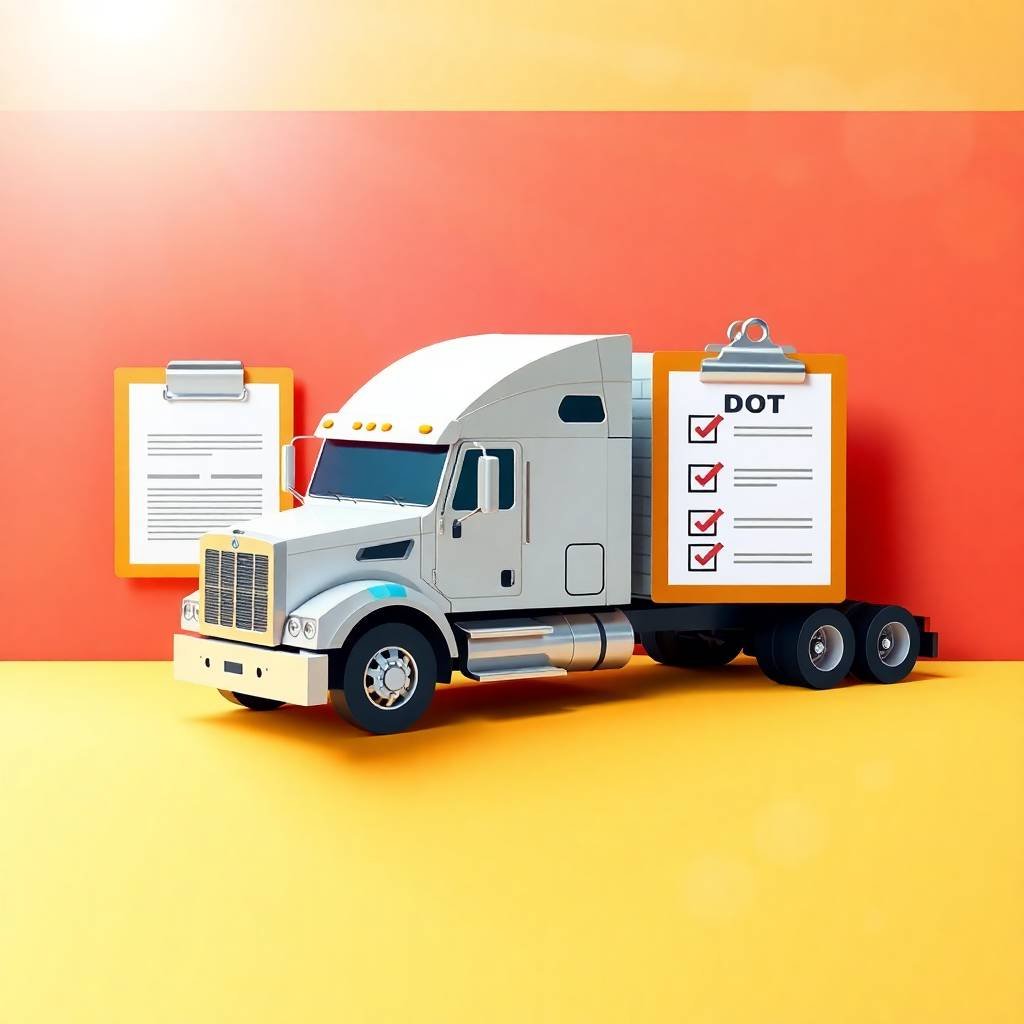
8. Step 7: Keep Testing Documentation Readily Accessible
Meeting Pre-Employment DOT Drug Testing Requirements involves more than just administering tests—it demands consistent, well-documented compliance. One of the most overlooked yet essential steps in the DOT compliance process is keeping your drug and alcohol testing documentation accessible and audit-ready. Whether you’re an owner-operator or manage a fleet, proper documentation plays a pivotal role in satisfying federal regulations and surviving FMCSA audits.
Why Documentation Matters for DOT Compliance
According to the U.S. Department of Transportation and the Federal Motor Carrier Safety Administration (FMCSA), all employers must maintain detailed records of their compliance with Pre-Employment DOT Drug Testing Requirements. This includes proof of test results, chain of custody forms, and driver consent documents.
These records must be readily available during audits or investigations. In fact, missing or poorly managed documentation is one of the top issues found in FMCSA compliance audits. Keeping organized records isn’t just smart—it’s mandatory.
For a comprehensive look at maintaining FMCSA records, visit our DOT Compliance Checklist.
What to Include in Your Testing Records
To fulfill Pre-Employment DOT Drug Testing Requirements, your documentation must include:
- Negative test results prior to performing safety-sensitive functions
- Chain of custody forms for all tests
- Testing facility and collector credentials
- Clearinghouse query confirmations
- Refusal-to-test documentation, if applicable
Additionally, every record must align with the FMCSA’s Drug & Alcohol Clearinghouse requirements. These documents should be part of the Driver Qualification File and stored securely, but also be easily retrievable during audits.
For assistance with organizing and maintaining these files, explore our DQ File Setup and Monitoring service.
Consequences of Inadequate Documentation
Neglecting documentation standards for Pre-Employment DOT Drug Testing Requirements can lead to serious violations. Common issues include:
- Missing test results
- Incomplete chain of custody
- Inaccessible records during audits
- Errors in the Clearinghouse reporting process
These mistakes can result in fines, operational shutdowns, and Safety Measurement System (SMS) score impacts. Read more about these pitfalls in our guide on FMCSA Compliance Mistakes.
Best Practices for Recordkeeping
- Digitize Your Records
Digital files are easier to access and manage. Use cloud-based platforms to store test results, consents, and Clearinghouse queries. - Review Regularly
Audit your documentation quarterly to ensure ongoing compliance with Pre-Employment DOT Drug Testing Requirements. Tools like our Drug and Alcohol Testing Management service make this easier. - Keep Backups
Have at least one backup of all files. This protects you during system failures or audits. - Use Compliance Services
Partnering with experts can minimize risk. Truckers Compliance Hub offers tailored services like DOT Audit Preparation and UCR Filing Assistance to support carriers in staying compliant year-round.
For advanced support, consider our comprehensive FMCSA Compliance Services for Owner Operators and Compliance Help for Trucking Companies.
Scheduling Help and Staying Informed
Need personalized assistance with your testing documentation? Schedule your free 30-minute consultation today. Our compliance experts can guide you through every aspect of Pre-Employment DOT Drug Testing Requirements.
Stay informed with the latest compliance news and practical tips by visiting TruckersComplianceHub.com. You’ll find expert content on topics like DQ File Violations and the FMCSA SMS 2025 updates.
You can also explore related services like IFTA, IRP & BOC-3 Support, designed to ease the burden of multi-state operations and regulatory filing.
Final Thoughts
Keeping testing documentation readily accessible is a critical step in meeting Pre-Employment DOT Drug Testing Requirements. Proper documentation protects your business, helps pass audits, and promotes safety on the road. By staying proactive and organized, you ensure your fleet or operation meets FMCSA standards without unnecessary risk.
For federal guidance, you can refer to WhiteHouse.gov or the FMCSA.

9. Step 8: Train Supervisors on Drug Testing Procedures and Compliance
Proper supervisor training is a critical step in fulfilling Pre-Employment DOT Drug Testing Requirements and maintaining ongoing compliance with federal safety standards. Supervisors are on the front lines of compliance enforcement, and their ability to recognize, respond to, and manage drug and alcohol testing procedures directly impacts your organization’s DOT audit readiness and safety rating.
Below, we break down why supervisor training is vital, what it should include, and how your fleet can stay ahead of FMCSA expectations.
The Role of Supervisors in DOT Drug Testing Compliance
Under FMCSA and Department of Transportation (DOT) regulations, all employers must train supervisors who oversee CDL drivers to identify the signs of drug and alcohol misuse. This is especially important when meeting Pre-Employment DOT Drug Testing Requirements and post-hire compliance tasks such as reasonable suspicion testing.
Failure to properly train supervisors can result in costly DQ file violations and lead to negative outcomes during FMCSA audits. Learn more in our DOT Audit Preparation 2025 resource.
What Should Supervisor Training Cover?
Effective training prepares supervisors to uphold Pre-Employment DOT Drug Testing Requirements and maintain workplace safety. Training should include:
- Overview of FMCSA and DOT regulations
- Understanding of testing triggers (e.g., pre-employment, random, reasonable suspicion, post-accident)
- Procedures for documenting and initiating tests
- Recognizing physical, behavioral, and performance indicators of substance misuse
- Proper recordkeeping to support compliance efforts
For a comprehensive checklist of compliance items your team should understand, visit our DOT Compliance Checklist.
Connecting Supervisor Training to Pre-Employment Testing
Supervisors must be familiar with the Pre-Employment DOT Drug Testing Requirements to ensure that no driver begins safety-sensitive functions without a negative test result on file. They also need to understand how to review test documentation and verify the driver’s status within the FMCSA Clearinghouse.
Our Drug and Alcohol Testing Management services simplify this process by overseeing all testing logistics and recordkeeping.
Integration With Driver Qualification File Requirements
Trained supervisors can also contribute to accurate and up-to-date Driver Qualification (DQ) files by ensuring that testing records are complete and properly filed. With the increasing complexity of regulatory mandates, incomplete or outdated DQ files are a frequent source of FMCSA compliance mistakes.
To streamline compliance, consider using our DQ File Setup and Monitoring services.
Tools and Resources for Better Supervisor Support
Properly trained supervisors help improve your fleet’s Safety Measurement System (SMS) scores. Equipping them with the right tools and compliance education protects your company from enforcement action.
At Truckers Compliance Hub, we offer extensive FMCSA compliance services for owner-operators and fleets of all sizes. These include UCR Filing Assistance, IFTA, IRP & BOC-3 Support, and more.
Stay updated on current and past compliance issues by visiting our blog and resource hub.
Staying Current with DOT and FMCSA Policies
Regulations surrounding Pre-Employment DOT Drug Testing Requirements are regularly updated by the White House, DOT, and FMCSA. Staying in step with these changes ensures your supervisors remain effective and informed.
We recommend conducting refresher training annually and after any regulatory update. Our team can guide you through these changes and how they affect your compliance practices.
Schedule Your Compliance Consultation Today
Supervisor training is not just a regulatory box to check—it’s a frontline defense against non-compliance. If you’re unsure whether your supervisors are fully prepared to manage Pre-Employment DOT Drug Testing Requirements, schedule a 30-minute consultation with our compliance experts today.
Also, explore our complete FMCSA Compliance Help for Trucking Companies to see how we support fleets from top to bottom.

10. Step 9: Audit Your Compliance Regularly to Stay Ahead of FMCSA Inspections
Regular internal audits are crucial for ensuring your fleet remains in full compliance with Pre-Employment DOT Drug Testing Requirements and other FMCSA regulations. Carriers that wait until a notice of inspection to review their compliance processes often find themselves scrambling—sometimes too late to avoid violations and penalties.
This article explains why ongoing compliance audits matter, how they help you stay inspection-ready, and which areas to prioritize for long-term success.
Why Regular Compliance Audits Are Essential
Whether you’re an owner-operator or managing a multi-driver fleet, staying ahead of the Federal Motor Carrier Safety Administration (FMCSA) is non-negotiable. A proactive approach that includes frequent audits ensures that your records are accurate, up to date, and aligned with Pre-Employment DOT Drug Testing Requirements.
Many common violations—such as missing drug test results or incomplete DQ files—can be prevented with scheduled internal reviews. Visit our full DOT Audit Preparation 2025 guide to learn how these audits should be structured.
Focus on Pre-Employment Testing Documentation
One of the highest-risk areas during an audit is drug and alcohol testing compliance. Carriers must maintain thorough documentation to meet Pre-Employment DOT Drug Testing Requirements. That includes:
- Proof of a negative drug test result before operating a commercial vehicle
- Accurate and secure storage of testing documentation
- Chain of custody forms and laboratory credentials
- Clearinghouse query reports confirming the driver’s eligibility
Failure to meet any of these components can result in substantial fines or out-of-service orders. We help mitigate that risk through our Drug and Alcohol Testing Management service.
Avoiding Common Compliance Mistakes
Routine audits help identify potential FMCSA compliance mistakes before they become reportable violations. Some of the most common errors we see during our audits include:
- Expired medical cards not reflected in the Safety Measurement System (SMS)
- Incorrect or missing UCR filings
- Lapsed or missing Clearinghouse registrations
- Non-compliant DQ file setups
Our clients use our DOT Compliance Checklist as a recurring tool to stay organized and proactive.
How to Structure Your Internal Audit
Start with a full review of your hiring and onboarding process to ensure Pre-Employment DOT Drug Testing Requirements are met. Verify the following:
- Each CDL driver has a negative pre-employment drug test result on file
- All documentation is readily accessible
- Queries and reporting are current with the FMCSA Drug & Alcohol Clearinghouse
Next, audit your driver qualification files, insurance, permits, IFTA/IRP registrations, and safety records.
Looking for expert guidance? Schedule a compliance consultation with our team.
Support Resources to Simplify Your Compliance Process
At Truckers Compliance Hub, we provide hands-on support to keep you compliant year-round. Our services include:
- DOT Audit Preparation
- DQ File Setup and Monitoring
- Drug and Alcohol Testing Management
- IFTA, IRP, and BOC-3 Support
- UCR Filing Assistance
For additional resources tailored to your business, view our pages for FMCSA Compliance Services for Owner Operators and FMCSA Compliance Help for Trucking Companies.
Stay Informed and Aligned with Federal Regulations
Federal standards set by Transportation.gov and WhiteHouse.gov are constantly evolving. It’s not enough to be compliant once a year—you need a system in place for continuous monitoring.
Our blog at TruckersComplianceHub.com is updated regularly with news, how-tos, and expert advice to help you meet Pre-Employment DOT Drug Testing Requirements and beyond.
Final Thoughts
Auditing your compliance practices isn’t just about avoiding penalties—it’s about building a safety-first culture that protects your drivers, your business, and the public. By regularly reviewing your adherence to Pre-Employment DOT Drug Testing Requirements, you create a solid foundation to pass FMCSA inspections with confidence.
Need help implementing a self-audit process? Book your consultation now and let our experts walk you through it step by step.
Disclaimer: Read our Disclaimer
Privacy Policy: Read our Privacy Policy
Terms of Service: Read our Terms

What are the key components of Pre-Employment DOT Drug Testing Requirements for new CDL drivers?

Pre-Employment DOT Drug Testing Requirements mandate that all CDL drivers must pass a drug test before performing any safety-sensitive duties. The test must be conducted using a U.S. Department of Health and Human Services (HHS)-certified lab, and results must be properly documented and filed. To ensure full compliance and maintain your records correctly, consider our DQ File Setup and Monitoring services, which help align your hiring process with FMCSA standards.
When should a company conduct a pre-employment drug test to meet FMCSA guidelines?

According to Pre-Employment DOT Drug Testing Requirements, the drug test must be conducted before the driver begins any safety-sensitive function. This is non-negotiable, and failure to comply may lead to violations during a DOT audit. If you’re preparing for an upcoming review, our DOT Audit Preparation services can help identify and correct gaps in your compliance process.
What documentation must be maintained to meet Pre-Employment DOT Drug Testing Requirements?

Employers must maintain a copy of the negative drug test result, proof of laboratory certification, and any communications with the Medical Review Officer (MRO). These records must be retained for a minimum of one year. Our Drug and Alcohol Testing Management program helps companies organize, monitor, and store all essential documentation to stay audit-ready and fully aligned with Pre-Employment DOT Drug Testing Requirements.
How does non-compliance with Pre-Employment DOT Drug Testing Requirements impact FMCSA audit results?

Non-compliance can lead to critical violations that negatively affect your CSA scores and trigger penalties or a full compliance review. Failing to follow Pre-Employment DOT Drug Testing Requirements can even result in being placed out of service. For proactive support, visit our DOT Audit Preparation service page to strengthen your compliance posture before any FMCSA inspections.
Can a Third-Party Administrator (TPA) help manage Pre-Employment DOT Drug Testing Requirements effectively?

Absolutely. A qualified TPA can handle the logistics of scheduling, conducting, and documenting drug tests in compliance with Pre-Employment DOT Drug Testing Requirements. This ensures your process is efficient and audit-proof. Our comprehensive Drug and Alcohol Testing Management services include TPA support designed to keep your company fully compliant and prepared.
Igor Iturriaga is a transportation compliance expert and founder of Dynamic 305 Miami LLC. He helps owner-operators and fleets stay FMCSA-compliant and audit-ready. https://www.linkedin.com/in/igor-iturriaga-64503217/
